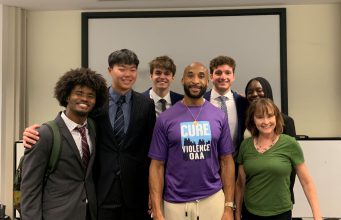Prior to becoming the Associate Dean for Leadership Development at Emory University’s Goizueta Business School, Ken Keen had a distinguished 40-year career in the U.S. Army, culminating as a Lieutenant General. Among his leadership roles, Keen was in charge of the Joint Task Force in Haiti following its devastating earthquake in 2010. Keen’s global experience from his military service, coupled with his current role at a leading business school, gives him a unique vantage point to compare the leadership training approaches from the military and business sectors.
“The military has always invested a great deal of resources in developing its leaders” Keen notes. “Throughout a military career, you are always returning to school for both technical expertise and leadership training. Businesses struggle with how much they are able to invest into leadership training in both time and money, but principally time.” Keen sees that “the military can learn a huge amount from business about the effectiveness versus efficiency ratio.” While acknowledging that efficiency is less paramount than effectiveness in military operations where the key thing is to win, not to show a profit; he sees that there is much the military could do to tighten its belt while remaining highly effective.
Keen brings this merging of the best from both the military and business worlds to – Emory Executive Education’s Managerial Leadership Program (MLP). MLP focuses on participants achieving a better understanding of their leadership strengths and weaknesses. In addition to content rich topics on individual and group leadership, MLP incorporates Birkman Personality Assessments, 360˚appraisals, and one-to-one coaching sessions. As Keen explains, this combination of assessments and coaching enables participants to learn about themselves and understand the feedback quickly.
What sets the program apart from other top-level leadership programs is the experiential ‘Leadership Response Course’ (LRC) that is drawn from the long-standing equivalent used in the US Army’s Leaders’ Reaction Course. The LRC, in both pure military and Emory Executive Education’s usage, takes five to eight groups of people through six back-to-back problem-solving events over the course of a day. Each event requires the team leader to receive a task, brief their team, develop a plan and then execute it, all within a 30-minute period. At the end of the 30 minutes there is a quick, ten-minute debrief or ‘After Action Review’ where the team analyses what they did well, what they did less well, and what they can do next time to improve.
The role of leader is rotated through the team with each new event. Ideally each participant assumes the leadership role once. The tasks for the event can vary from classic equipment- based ones, which might involve planks to enable the team’s passage across a ‘minefield’ to gathering information outside the group. As Keen describes it, the tasks are formulated with a focus on leadership rather than team-building.
“In the initial event, typically we see a 70-80% failure rate, as the day progresses and the team sees that it needs to work differently to accomplish the tasks – which could be less planning and being quicker to execution, or maybe better delegation of tasks within each event – the leaders begin to see how they can run the group more effectively… and also as the leadership role rotates, the other participants begin to see how they can be better followers.” Keen sees the ability to follow as part-and-parcel of enabling effective teams. The better people understand themselves, the better they can be as followers.
Once all six tasks have been completed the program reconvenes for an end-of-day, longer reflection on the experience and insights that can be drawn. These rich conversations promote learning in an enduring way, as participants relate more closely with issues having already experienced them and by sharing the challenges and solutions they encountered through the LRC. The group discussion is followed by more one-on-one coaching where individual emotions and personal development issues can be more granularly explored.
While organizations still struggle to carve out time to develop the leadership capacity of their managers, this mixture of personal awareness and team leading experience under controlled conditions is, Keen believes, a powerful way to fast-track managerial leadership development. Keen has observed this being impactful in both military and business organizations.











